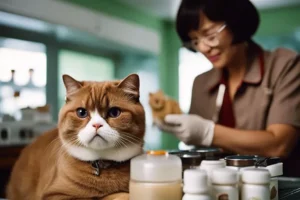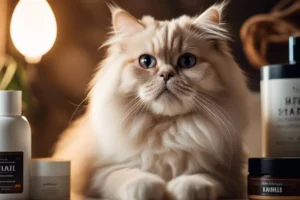Rarely do I come across a cat breed as majestic and impressive as the Maine Coon. Their large size and striking appearance make them a popular choice for cat enthusiasts. However, as a proud Maine Coon owner, I have noticed that their claws can pose a unique challenge when it comes to injuries. In this guide, I will discuss the factors that make Maine Coons more prone to claw injuries, as well as tips and tricks for keeping their claws healthy and preventing potential mishaps.
Key Takeaways:
- Maine Coons have a higher likelihood of claw injuries: Due to their large size and active nature, Maine Coons are more prone to claw injuries compared to other cat breeds.
- Regular nail trimming and scratching posts are crucial: It is important for Maine Coon owners to regularly trim their cat’s nails and provide scratching posts to help prevent claw injuries.
- Monitor your Maine Coon’s claws for signs of injury: Keep an eye on your Maine Coon’s claws for any signs of injury, such as bleeding, limping, or excessive licking, and seek veterinary care if necessary.
Types of Claw Injuries
Any injury to a cat’s claws can be painful and potentially serious. There are several types of claw injuries that cats can experience, including:
- Lacerations: These are deep cuts or tears in the claw, often caused by a sharp object or trauma.
- Fractures: A fracture can occur when a cat’s claw is broken or cracked, which can lead to pain and difficulty walking.
- Ingrown Nails: This occurs when a cat’s nails grow into the pad of their paw, leading to discomfort and potential infection.
- Infected Claws: If a cat’s claw becomes infected, it can cause pain, swelling, and redness.
- Amputated Claws: In severe cases, a cat’s claw may need to be amputated due to injury or disease.
This information is important for cat owners to be aware of, as it can help them recognize potential claw injuries and seek prompt medical attention for their feline companions.
Common Claw Injuries Among Cats
Claw injuries are quite common among cats, as their claws are an essential tool for hunting, climbing, and self-defense. I’ve seen cats come into the clinic with various types of claw injuries, ranging from minor cuts to more severe fractures. It’s important for cat owners to regularly inspect their cat’s claws and be aware of any signs of injury or discomfort.
Specific Claw Injuries in Maine Coons
Maine Coons, due to their large size and active nature, may be more prone to certain types of claw injuries compared to other cat breeds. I’ve observed that they can be more susceptible to fractures and lacerations due to their robust build and energetic behavior. As a Maine Coon owner, it’s crucial to pay extra attention to your cat’s claws and seek immediate veterinary care if you notice any signs of injury.
Factors Influencing Claw Injuries in Maine Coons
The Maine Coon breed is known for its regal appearance and large, impressive size. However, this majestic breed is also prone to claw injuries due to several factors. Understanding these factors can help Maine Coon owners take proactive steps to mitigate the risk of claw injuries in their beloved pets.
Physical Factors
The physical attributes of Maine Coons can influence their susceptibility to claw injuries. The size and strength of their claws, coupled with their active nature, can lead to accidental injuries during play and exploration. Additionally, joint issues can impact claw health, as they may affect the alignment and function of the claws. Knowing how these physical factors contribute to claw injuries can help you anticipate and prevent potential issues.
- Size and strength of claws
- Active nature
- Joint issues
Knowing how these physical factors contribute to claw injuries can help you anticipate and prevent potential issues.
Environmental Factors
Environmental factors can also play a significant role in claw injuries among Maine Coons. Sharp or rough surfaces in the home or outdoor environment can cause abrasions or tears to the claws. Additionally, stress or anxiety can lead to excessive claw grooming, increasing the risk of injury. Any changes in the environment or routine can impact claw health and predispose Maine Coons to injuries.
- Sharp or rough surfaces
- Stress or anxiety
- Changes in the environment or routine
Any changes in the environment or routine can impact claw health and predispose Maine Coons to injuries.
Safety Measures and Tips
Now that we have established the unique claws of Maine Coons, it’s essential to take specific safety measures to prevent injuries and maintain their claws’ health. Below are some important tips:
- Regularly trim Maine Coon claws to prevent them from becoming too long and prone to getting caught or breaking.
- Invest in scratching posts and pads to provide an appropriate outlet for your Maine Coon’s scratching instincts.
- Ensure your Maine Coon’s environment is free of sharp edges or hazards that could potentially injure their claws.
This guide on Are Maine Coons claws different? provides further insights into the unique characteristics of Maine Coon claws.
Tips for Preventing Claw Injuries
Preventing claw injuries in your Maine Coon can be crucial for their overall health and well-being. Here are some tips to help you protect their claws:
- Regularly check and examine your Maine Coon’s claws for any signs of damage or overgrowth.
- Keep your Maine Coon’s environment safe and clutter-free to prevent any accidents that could lead to claw injuries.
- Provide appropriate scratching surfaces and toys to encourage healthy claw maintenance.
Perceiving any signs of discomfort or changes in your Maine Coon’s behavior can be an indication of potential claw injuries that need attention.
Step-by-step Process of Claw Care for Maine Coons
When it comes to caring for your Maine Coon’s claws, a step-by-step process can ensure their claws remain healthy and injury-free. Here is a simple guide to claw care:
| Step 1: | Regularly inspect your Maine Coon’s claws for any signs of damage or overgrowth. |
| Step 2: | Use appropriate claw trimming tools and techniques to maintain the optimal length of your Maine Coon’s claws. |
| Step 3: | Provide your Maine Coon with suitable scratching surfaces and toys to promote healthy claw maintenance. |
| Step 4: | Keep your Maine Coon’s environment safe and hazard-free to prevent claw injuries. |
Pros and Cons of Maine Coons Regarding Claw Injuries
Despite their large size and active nature, Maine Coons are generally less prone to claw injuries compared to other breeds. However, there are still some pros and cons to consider when it comes to their susceptibility to claw injuries.
| Pros | Cons |
| Large, strong claws for climbing and hunting | Accidental scratches during play |
| Natural scratching instincts to maintain claw health | Outdoor risks for claw injuries |
| Less prone to ingrown nails | Potential for indoor furniture damage |
Advantages of Maine Coons’ Habits for Claw Health
Maine Coons have natural scratching instincts, which can help them maintain the health of their claws. Their large, strong claws are well-suited for climbing and hunting, but they also serve the purpose of keeping the claws in good condition. Additionally, they are less prone to ingrown nails, reducing the risk of claw injuries caused by overgrown or ingrown claws.
Disadvantages of Maine Coons’ Habits for Claw Health
On the downside, Maine Coons can accidentally scratch or injure their claws during play. This risk is especially present during rough play or when they are overexcited. Furthermore, if they have outdoor access, they may be at higher risk of sustaining claw injuries from various outdoor elements. Another potential downside is the risk of indoor furniture damage, as Maine Coons may use their claws to mark their territory or relieve stress.
Are Maine Coons More Prone To Claw Injuries?
Following this exploration of whether Maine Coons are more prone to claw injuries, it is clear that this breed’s large size and strong hunting instincts put them at a higher risk for injuries. It is crucial to regularly inspect and maintain your Maine Coon’s claws, as well as provide appropriate scratching posts and toys to help them keep their claws healthy. Additionally, it is important to seek veterinary care at the first sign of any claw injury to prevent further complications. By being proactive and attentive to your Maine Coon’s claws, you can help prevent injuries and keep your cat happy and healthy.
FAQ
Q: Are Maine Coons More Prone To Claw Injuries?
A: Yes, due to their large size and active nature, Maine Coons are more prone to claw injuries compared to other cat breeds.
Q: What are the common causes of claw injuries in Maine Coons?
A: Claw injuries in Maine Coons are commonly caused by environmental factors such as rough surfaces, sharp objects, or accidental traumas during play or outdoor activities. Additionally, overgrown claws can also lead to injuries if not properly trimmed.
Q: How can I prevent claw injuries in my Maine Coon?
A: To prevent claw injuries, it is important to provide your Maine Coon with appropriate scratching posts and surfaces to keep their claws healthy and trimmed. Regular trimming of their claws and keeping their environment safe from sharp objects and rough surfaces can also help minimize the risk of claw injuries.



